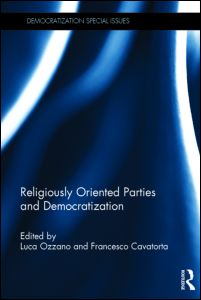Religiously Oriented Parties and Democratization Edited by Luca Ozzano, Francesco Cavatorta

Routledge – 2014 – 174 pages
Series: Democratization Special Issues
http://www.routledge.com/books/details/9781138775381/
To the surprise of both academics and policy-makers, religion has not been relegated entirely to the private sphere; quite the contrary. Over the last few decades, religion has begun to play a significant role in public affairs and, in many cases, directly in political systems. This edited volume analyses in detail how religion and religious precepts inform the ideology, strategies and electoral behaviour of political parties. Working with an original and innovative typology of religiously oriented political parties, the book examines cases from different regions of the world and different religious traditions to highlight the significance of religion for party politics. This interest for religiously oriented parties is combined with an interest in processes of democratic change and democratic consolidation. Political parties are central to the success of processes of democratization while religion is seen in many circles as an element that prevents such success because it is perceived to be a polarising factor detrimental to the consensus necessary to build a liberal-democratic system. Through the different case-studies presented here, a much more complex picture emerges, where religiously oriented political parties perform very different and often contradicting roles with respect to democratic change.
This book was published as a special issue of Democratization.
Contents:
1. Introduction: religiously oriented parties and democratization (Luca Ozzano and Francesco Cavatorta) 2. The many faces of the political god: a typology of religiously oriented parties (Luca Ozzano) 3. The perils of polarization and religious parties: the democratic challenges of political fragmentation in Israel and Turkey (Sultan Tepe) 4. Moderation through exclusion? The journey of the Tunisian Ennahda from fundamentalist to conservative party (Francesco Cavatorta and Fabio Merone) 5. Refining the moderation thesis. Two religious parties and Indian democracy: the Jana Sangh and the BJP between Hindutva radicalism and coalition politics (Christophe Jaffrelot) 6. Ahab and the white whale: the contemporary debate around the forms of Catholic political commitment in Italy (Alberta Giorgi) 7. Religious parties in Chile: the Christian Democratic Party and the Independent Democratic Union (Juan Pablo Luna, Felipe Monestier and Fernando Rosenblatt) 8. Religion and democratization in Northern Ireland: is religion actually ethnicity in disguise? (Eoin O'Malley and Dawn Walsh) 9. Conclusion: reassessing the relation between religion, political actors, and democratization (Luca Ozzano and Francesco Cavatorta)